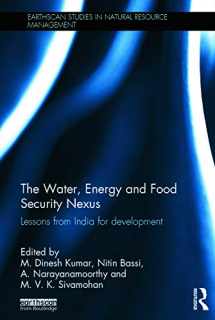
The Water, Energy and Food Security Nexus: Lessons from India for Development (Earthscan Studies in Natural Resource Management)
ISBN-13:
9780415733038
ISBN-10:
0415733030
Edition:
1
Author:
M. Dinesh Kumar, M.V.K. Sivamohan, Nitin Bassi, A. Narayanamoorthy
Publication date:
2014
Publisher:
Routledge
Format:
Hardcover
246 pages
FREE US shipping
Book details
ISBN-13:
9780415733038
ISBN-10:
0415733030
Edition:
1
Author:
M. Dinesh Kumar, M.V.K. Sivamohan, Nitin Bassi, A. Narayanamoorthy
Publication date:
2014
Publisher:
Routledge
Format:
Hardcover
246 pages
Summary
The Water, Energy and Food Security Nexus: Lessons from India for Development (Earthscan Studies in Natural Resource Management) (ISBN-13: 9780415733038 and ISBN-10: 0415733030), written by authors
M. Dinesh Kumar, M.V.K. Sivamohan, Nitin Bassi, A. Narayanamoorthy, was published by Routledge in 2014.
With an overall rating of 4.5 stars, it's a notable title among other
books. You can easily purchase or rent The Water, Energy and Food Security Nexus: Lessons from India for Development (Earthscan Studies in Natural Resource Management) (Hardcover) from BooksRun,
along with many other new and used
books
and textbooks.
And, if you're looking to sell your copy, our current buyback offer is $0.3.
Description
It is becoming increasingly recognized that for the optimal sustainable development and use of natural resources, an integrated approach to water management, agriculture, food security and energy is required. This "nexus" is now the focus of major attention by researchers, policy-makers and practitioners. In this book, the authors show how these issues are being addressed in India as part of its economic development, and how these can provide lessons for other developing nations. They address the conflicting claims of water resources for irrigation and hydropower, where both are scarce at the national level for fostering water and energy security. They also consider the relationship between water for irrigated agriculture and household use and its impact on rural poverty. They identify weaknesses in the current hydropower development programme in India that are preventing it from being an ecologically sustainable, socially just and economically viable solution to meeting growing energy demand. The empirical analyses presented show the enormous scope for co-management of water, energy, agricultural growth and food security through appropriate technological interventions and market instruments.


We would LOVE it if you could help us and other readers by reviewing the book
Book review

Congratulations! We have received your book review.
{user}
{createdAt}
by {truncated_author}


